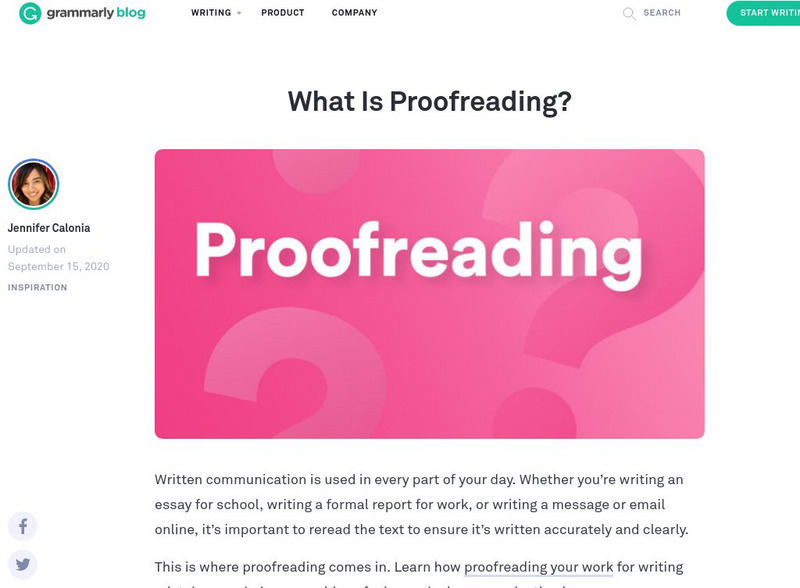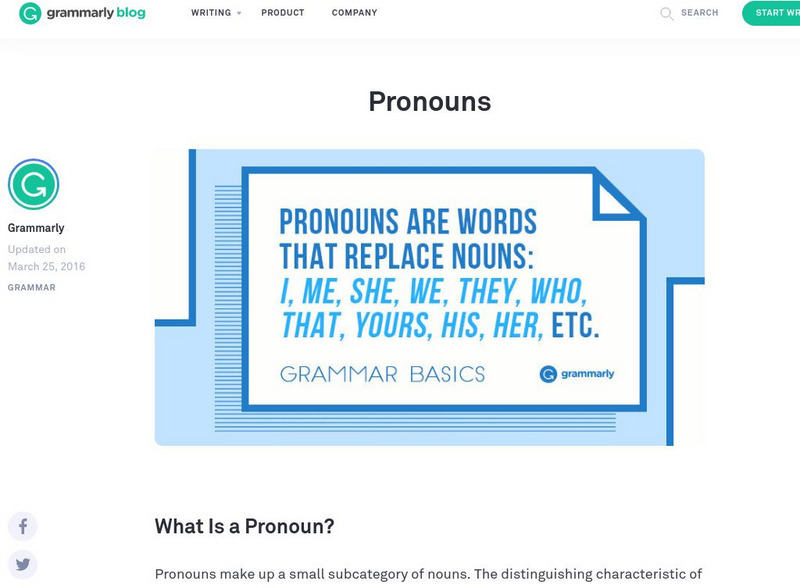Grammarly
Grammarly Blog: What Are Homophones?
This page explains homophones (words that sound alike, but have different spellings and meanings) and provides the most common examples.
Grammarly
Grammarly Blog: What Is Proofreading?
Explains what proofreading is, how it differs from editing, and provides tips on how to proofread.
Grammarly
Grammarly Blog: Capitalization
This page reminds the writer to follow capitalization rules including for beginning of sentences, proper nouns, and titles of people and works.
Grammarly
Grammarly Blog: Run on Sentences
Rules and examples for using commas when writing a complex sentence.
Grammarly
Grammarly Blog: Simple Present Tense (Present Indefinite)
An explanation with examples of simple present verb tense in sentences.
Grammarly
Grammarly Blog: Correlative Conjunctions
This Grammarly Handbook resource clarifies how to use correlative conjunctions correctly in sentences. Numerous examples are provided in this resource.
Grammarly
Grammarly Blog: Comma Between Correlative Conjunction Sets
This page provides the rules and exceptions for the use of commas when using corratative conjuction sets such as either or, or neither nor, or not only but also. No commas are needed between them unless the comma is needed for other...
Grammarly
Grammarly Blog: Parallelism With Either, Or
An explanation and examples of using parallel structure with the correlative conjunction either or.
Grammarly
Grammarly Blog: Ending a Sentence With a Preposition
This page explains when it is acceptable to end a sentence with a preposition and when it is not.
Grammarly
Grammarly Blog: Italics and Underlining
An explanation of the uses of italics and underlining. Links to additional information are provided.
Grammarly
Grammarly Blog: Italics and Underlining: Titles of Works
An explanation and examples using italics/underlining when writing titles.
Grammarly
Grammarly Blog: Italics and Underlining: Words, Letters, Numbers Gram. Rules
An explanation and examples underlining/italicizing words, letters, and numbers when they refer to themselves.
Grammarly
Grammarly Blog: Indefinite Articles: A and An
An explanation with examples of indefinite articles and how they are used in sentences.
Grammarly
Grammarly Blog: Pronouns
This page focuses on pronouns including definitions, personal pronouns, antecedents, relative pronouns, who vs. whom, demonstrative, indefinite, reflexive and intensive, possessive, and interrogative pronouns. Examples are provided for...
Grammarly
Grammarly Blog: What Are Adjectives?
This blog article explains what adjectives are, what they can do in sentences, and provides examples of each.
Grammarly
Grammarly Blog: Idioms and Phrases
An explanation and examples of idioms and how to use context clues to understand their meanings.
Grammarly
Grammarly Blog: Idioms and Their Meanings
An explanation and examples of idioms and their geographic ties.
Grammarly
Grammarly Blog: Double Negatives: 3 Rules You Must Know
This page explains the 3 rules for double negatives: each subject-predicate construction should only have one negative form, a double negative is a non-standard sentence construction that uses two negative forms, and standard English is...
Grammarly
Grammarly Blog: Verb Forms
This page explains the five forms of verbs: root, third-person singular,present participle, past, and past participle and provides examples of each.
Grammarly
Grammarly Blog: Imperative Verbs: Definition and Examples
An explanation and examples of imperative verbs.
Grammarly
Grammarly Blog: Future Perfect Tense
This page explains what future perfect tense means and how it is formed.
Grammarly
Grammarly Blog: Hyphen
An explanation of the use of a hyphen and links to specific hyphen usage rules.
Grammarly
Grammarly Blog: What Is a Hyphen?
This page explains what hyphens are, what they can do, and provides examples of their uses.
Grammarly
Grammarly Blog: Hyphen Connecting Words Functioning as an Adjective
Rules and examples for using hyphens when writing compound expressions.

























